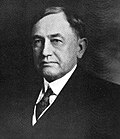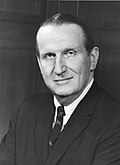Lieutenant Governor of Alabama Last updated January 09, 2026 Second-highest elected office in Alabama
The lieutenant governor of Alabama is the president of the Alabama Senate , elected to serve a four-year term. The office was created in 1868, [ 1] abolished in 1875, [ 2] and recreated in 1901. [ 3] According to the current constitution, should the governor be out of the state for more than 20 days, the lieutenant governor becomes acting governor , and if the governor dies, resigns or is removed from office (via impeachment), the lieutenant governor ascends to the governorship. [ 4] Earlier constitutions said the powers of the governor devolved upon the successor, rather than them necessarily becoming governor, [ 5] but the official listing includes these as full governors. [ 6] The governor and lieutenant governor are not elected on the same ticket .
History In 1868, the state of Alabama issued a constitution which provided for the office of lieutenant governor. The document prescribed that the officer was to serve as the president of the State Senate and cast tie-breaking votes in that body, and made them first in line of succession to the governor's office. [ 7] Andrew J. Applegate was the first person to serve as lieutenant governor. [ 8] In 1875, conservative Democrats determined the content of a new constitution which abolished the office in an attempt to reduce the size of state government. Alabama convened another constitutional convention in 1901. During its session, the incumbent governor died. Partly motivated by the lack of a clearly delineated line of gubernatorial succession, the delegates reestablished the office of lieutenant governor with responsibilities similar to those it previously held. Its constitutional responsibilities have been little altered since. [ 7]
Since the office's inception, 31 people have served as lieutenant governor of Alabama. Of those, only two have served two terms or more. The first woman to hold the office, Lucy Baxley , served from 2003 to 2007. [ 7]
The lieutenant governor serves as president of the State Senate and assumes the office of governor in the event the gubernatorial office becomes vacant. [ 9] Senate rules empower the lieutenant governor to determine the composition of Senate committees and refer bills to committees of their choosing. As a result, the lieutenant governor typically exercises significant influence over the progress of legislation in the body. [ 7]
The state constitution does not provide any remedy in the event the lieutenant governor's office becomes vacant. [ 7] In such an instance, their role as the presiding officer of the State Senate is assumed by the Senate president pro tempore. [ 10]
Notes ↑ Lieutenant governors represented the same party as their governor unless noted. ↑ Cunningham acted as governor from April 25, 1904, to March 5, 1905, while Jelks was absent from the state. [ 28] 1 2 3 4 5 6 7 8 9 10 11 12 13 14 15 16 17 18 19 20 21 22 23 24 25 The constitutional start date for 1911 was January 16, and that is when Governor Emmet O'Neal and Lieutenant Governor Walter D. Seed Sr. were sworn in. [ 33] However, the Alabama Supreme Court ruled in the case of Oberhaus v. State ex rel. McNamara that, regardless of when the swearing in took place, B. B. Comer 's gubernatorial term did not end until the end of Monday, and O'Neal's term did not begin until the first minute of the next day. [ 34] This precedent appears to have quietly continued, as coverage of Robert J. Bentley 's inauguration in 2011 noted he would not officially take office until midnight. [ 35] As lieutenant governors are elected to the same term as governor, lieutenant governors since 1911 that served to the end of their term are noted as leaving office on Monday, and their successor taking office on Tuesday. ↑ McDowell acted as governor from July 10, 1924, to July 11, 1924, while Brandon was absent from the state. [ 6] ↑ Brewer was acting governor on July 25, 1967, when Wallace had been absent from the state for 20 days; she returned to the state later that day. [ 6] [ 82] ↑ Beasley acted as governor from June 5, 1972, to July 7, 1972, while Wallace was absent from the state. [ 6] ↑ McMillan instead ran unsuccessfully for the Democratic nomination for governor. ↑ Baxley instead ran unsuccessfully for the Democratic nomination for governor. 1 2 3 Represented the Republican Party ↑ Windom instead ran unsuccessfully for the Republican nomination for governor. ↑ Represented the Democratic Party ↑ Baxley instead ran unsuccessfully for governor. ↑ Ainsworth's second term began on January 17, 2023, and will expire January 18, 2027; he will be term-limited. References General Constitutions Specific ↑ 1868 Const. art. V, § 1 ↑ 1875 Const. art. V, § 1 ↑ AL Const. art. V, § 112 ↑ AL Const. art. V, § 127 ↑ 1819 Const. art. IV, § 18; 1861 Const. art. IV, § 18; 1865 Const. art V, § 19; 1868 Const. art. V, § 15; 1875 Const. art. V § 15 1 2 3 4 "Alabama Governors" . Alabama Department of Archives and History . Archived from the original on May 2, 2015. Retrieved April 10, 2012 . 1 2 3 4 5 Moody, Brad (March 27, 2023). "Office of the Lieutenant Governor" . Encyclopedia of Alabama . Alabama Humanities Alliance. Retrieved July 10, 2023 . ↑ Shiver, Joshua (March 27, 2023). "Reconstruction Constitutions" . Encyclopedia of Alabama . Alabama Humanities Alliance. Retrieved July 12, 2023 . ↑ "On more look at what's on the Alabama ballot" . The Dothan Eagle . Associated Press. November 8, 2022. p. A8. ↑ Lockette, Tim (April 11, 2017). "Governor resigns amid affair scandal, pleads to two charges" . The Anniston Star . pp. 1A, 4A . ↑ "Andrew J. Applegate" . Alabama Department of Archives and History . August 25, 2009. Archived from the original on December 14, 2023. Retrieved December 14, 2023 . ↑ "Governor of Alabama Inaugurated" . The Daily Standard . July 14, 1868. p. 3. Retrieved December 4, 2023 – via Newspapers.com. July 13 — Gov. Smith and Lieut. Gov. Applegate were sworn in to-day. ↑ "Republican Platform" . Daily State Sentinel . January 28, 1868. p. 2. Retrieved December 6, 2023 . ↑ "Edward Hawthorne Moren" . Alabama Department of Archives and History . August 25, 2009. Archived from the original on December 14, 2023. Retrieved December 14, 2023 . ↑ Ala. General Assembly. Journal of the House of Representatives . 1870— 71 sess., 25 , accessed December 4, 2023 ↑ Ala. General Assembly. Journal of the Senate . 1872 sess., 37 , accessed December 3, 2023 ↑ "Democratic and Conservative Nominations" . The Independent Monitor . November 1, 1870. p. 2. Retrieved December 6, 2023 . ↑ "Alexander McKinstry" . Alabama Department of Archives and History . August 25, 2009. Archived from the original on December 14, 2023. Retrieved December 14, 2023 . ↑ "Politics in Alabama" . The Baltimore Sun . November 26, 1872. p. 4. Retrieved December 4, 2023 . ↑ Ala. General Assembly. Journal of the Senate . 1874— 75 sess., 30 , accessed December 4, 2023 ↑ "The Election" . The Times-Argus . November 1, 1872. p. 1. Retrieved December 6, 2023 . ↑ "Robert Fulwood Ligon" . Alabama Department of Archives and History . July 19, 2011. Archived from the original on December 14, 2023. Retrieved December 14, 2023 . ↑ Ala. General Assembly. Journal of the Senate . 1874— 75 sess., 40 , accessed December 4, 2023 ↑ "Democratic Ticket" . The Clarke County Democrat . November 3, 1874. p. 4. Retrieved December 6, 2023 . ↑ "Russell Cunningham" . Alabama Department of Archives and History . February 7, 2014. Archived from the original on December 14, 2023. Retrieved December 14, 2023 . ↑ "Governor Took Oath of Office at Noon Today" . The Birmingham News . January 19, 1903. p. 1. Retrieved December 4, 2023 . ↑ "The Democratic Ticket" . The Birmingham News . November 1, 1902. p. 14. Retrieved December 6, 2023 . ↑ "Russell Cunningham" . Alabama Department of Archives and History . Archived from the original on November 11, 2014. Retrieved November 25, 2018 . ↑ "Henry Bramlette Gray" . Alabama Department of Archives and History . August 25, 2009. Archived from the original on December 14, 2023. Retrieved December 14, 2023 . ↑ "The New Governor Gives First Order" . The Birmingham News . January 14, 1907. p. 14. Retrieved December 4, 2023 . ↑ "Democratic Ticket" . Franklin County Times . November 1, 1906. p. 2. Retrieved December 6, 2023 . ↑ "Walter Dudley Seed, Sr" . Alabama Department of Archives and History . August 25, 2009. Archived from the original on December 14, 2023. Retrieved December 14, 2023 . ↑ "Thousands See Gov. Emmet O'Neal Inaugurated" . The Montgomery Advertiser . January 17, 1911. p. 1. Retrieved December 4, 2023 . ↑ Oberhaus v. State ex rel. McNamara, pp. 483– 499 ↑ White, David (January 17, 2011). "Robert Bentley Ready To Take Office As Next Alabama Governor" . The Birmingham News . Retrieved December 10, 2018 . Bentley under state law won't officially be governor until just after the stroke of midnight Tuesday morning. ↑ "State and County Democratic Ticket" . The Moulton Advertiser . November 1, 1910. p. 1. Retrieved December 6, 2023 . ↑ "Thomas Erby Kilby" . National Governors Association . Retrieved January 18, 2023 . ↑ Breedlove, Michael A. (June 3, 2021). "Thomas E. Kilby (1919-23)" . Encyclopedia of Alabama . Retrieved January 18, 2023 . ↑ Ala. General Assembly. Journal of the Senate . 1915 sess., 351 , accessed December 4, 2023 ↑ "Vote Is Light and Little Interest Is Taken in Election" . The Birmingham News . November 3, 1914. p. 1. Retrieved December 6, 2023 . ↑ "Nathan L. Miller" . Alabama Department of Archives and History . October 18, 2006. Archived from the original on December 6, 2006. ↑ Ala. General Assembly. Journal of the Senate . 1919 sess., 145 , accessed December 4, 2023 ↑ "Republicans Have Little Hopes of Winning in State" . The Montgomery Advertiser . November 3, 1918. p. 3. Retrieved December 6, 2023 . ↑ "Charles Samuel McDowell, Jr" . Alabama Department of Archives and History . August 25, 2009. Archived from the original on December 14, 2023. Retrieved December 14, 2023 . ↑ "Throngs Gather to Attend Inaugural of Popular Chieftain" . The Montgomery Advertiser . January 15, 1923. p. 1. Retrieved December 4, 2023 . ↑ "Democratic Nominees" . The Cleburne News . November 2, 1922. p. 4. Retrieved December 6, 2023 . ↑ "William Columbus Davis" . Alabama Department of Archives and History . August 21, 2009. Archived from the original on December 14, 2023. Retrieved December 14, 2023 . ↑ Ala. General Assembly. Journal of the Senate . 1927 sess., 139 , accessed December 4, 2023 ↑ "Little Doubt in State Vote" . The Birmingham Post . November 1, 1926. p. 9. Retrieved December 6, 2023 . ↑ "Hugh Davis Merrill" . Alabama Department of Archives and History . May 23, 2017. Archived from the original on December 14, 2023. Retrieved December 14, 2023 . ↑ "Governor Takes Up Duty Without Fuss or Feathers" . The Birmingham News . January 19, 1931. p. 2. Retrieved December 4, 2023 . ↑ "Party's Leaders Address Rally at Birmingham" . The Montgomery Advertiser . November 1, 1930. p. 1. Retrieved December 6, 2023 . ↑ "Thomas E. Knight, Jr" . Alabama Department of Archives and History . August 21, 2009. Archived from the original on December 14, 2023. Retrieved December 14, 2023 . ↑ Davis, George L. (January 15, 1935). "Col. Bibb Graves Again Assumes Alabama's Helm" . The Montgomery Advertiser . p. 1. Retrieved July 29, 2023 . ↑ "Democratic Party" . Shelby County Reporter . November 1, 1934. p. 1. Retrieved December 6, 2023 . ↑ "Albert Carmichael" . Alabama Department of Archives and History . August 21, 2009. Archived from the original on December 14, 2023. Retrieved December 14, 2023 . ↑ "Carmichael Takes Oath from Justice" . The Huntsville Times . Associated Press. January 16, 1939. p. 3. Retrieved December 4, 2023 . ↑ "Election to Be Held Tuesday November 8" . The Phenix-Girard Journal . November 4, 1938. p. 1. Retrieved December 6, 2023 . ↑ "Leven Handy Ellis" . Alabama Department of Archives and History . August 20, 2009. Archived from the original on December 14, 2023. Retrieved December 14, 2023 . ↑ "Sparks Delivers His Inaugural Speech on Capital Hill Monday" . Our Mountain Home . January 20, 1943. p. 4. Retrieved December 4, 2023 . ↑ "Small Local Vote Forecast Tomorrow" . The Dothan Eagle . November 2, 1942. p. 1. Retrieved December 6, 2023 . ↑ "James Clarence Inzer" . Alabama Department of Archives and History . August 20, 2009. Archived from the original on December 14, 2023. Retrieved December 14, 2023 . ↑ "Huge Crowd Sees the Ceremonies" . The Birmingham Post . UP. January 20, 1947. p. 7. Retrieved December 4, 2023 . ↑ "Vote Control Plan Centers State Ballot" . The Decatur Daily . November 3, 1946. p. 2. Retrieved December 6, 2023 . 1 2 "James B. Allen" . Alabama Department of Archives and History . August 20, 2009. Archived from the original on December 14, 2023. Retrieved December 14, 2023 . ↑ "Persons Takes Oath, Vows He Won't Seek Office Again" . Birmingham Post-Herald . January 16, 1951. p. 1. Retrieved December 4, 2023 . ↑ "General Election to Be Held Tuesday" . The Atmore Advance . November 2, 1950. p. 1. Retrieved December 6, 2023 . ↑ "William Hardwick" . Alabama Department of Archives and History . August 20, 2009. Archived from the original on December 14, 2023. Retrieved December 14, 2023 . ↑ "Folsom Takes Oath Chief Executive for Second Time" . The Florala News . January 20, 1955. p. 1. Retrieved December 4, 2023 . ↑ "Alabama Vote Reported Heavy; Total Ballot May Top 400,000" . Alabama Journal . November 2, 1954. pp. 2A. Retrieved December 6, 2023 . ↑ "Albert Boutwell" . Alabama Department of Archives and History . August 20, 2009. Archived from the original on December 14, 2023. Retrieved December 14, 2023 . ↑ Lake, Clancy (January 19, 1959). "No Segregation Compromise, Patterson Vows" . The Birmingham News . p. 1. Retrieved December 4, 2023 . ↑ "Boutwell Says Legislature Will Correct Docks 'Abuses' . The Birmingham News . November 1, 1958. p. 14. Retrieved December 6, 2023 . ↑ "Allen Sworn In, Calls for Progress" . Birmingham Post-Herald . January 15, 1963. p. 4. Retrieved December 4, 2023 . ↑ "Candidates for State Offices and Congress" . The Florence Herald . November 1, 1962. p. 1. Retrieved December 6, 2023 . ↑ "Albert Preston Brewer" . National Governors Association . Retrieved January 18, 2023 . ↑ Harvey, Gordon (November 13, 2020). "Albert P. Brewer (1968-71)" . Encyclopedia of Alabama . Retrieved January 18, 2023 . ↑ "Brewer Predicts 'very Progressive 4 Years' . Birmingham Post-Herald . January 17, 1967. p. 17. Retrieved December 4, 2023 . ↑ "Voters to Use Four-Party Ballots in Tuesday's Election" . Abbeville Herald . November 3, 1966. p. 1. Retrieved December 6, 2023 . ↑ Owen, Thomas McAdory (1979). Alabama Official and Statistical Register Alabama Department of Archives and History . p. 17. Retrieved September 28, 2008 . ↑ Armbrester, Margaret E. (December 19, 2017). "Jere Beasley Sr. (1972)" . Encyclopedia of Alabama . Retrieved January 18, 2023 . ↑ "Beasley Sworn In As Lt. Governor" . Alabama Journal . January 19, 1971. p. 14. Retrieved December 5, 2023 . ↑ Bennett, James (November 2, 1970). "Five Candidates Are Seeking Seat of Lieutenant Governor" . Birmingham Post-Herald . p. 1. Retrieved December 6, 2023 . ↑ "George McMillan, Jr" . Alabama Department of Archives and History . August 20, 2009. Archived from the original on December 14, 2023. Retrieved December 14, 2023 . ↑ Bruer, Frank (January 16, 1979). "Eight State Leaders Take Oaths of Office" . Birmingham Post-Herald . p. 9. Retrieved December 5, 2023 . ↑ Bubbett, Vic (November 5, 1978). "Election Turnout Unpredictable" . The Dothan Eagle . p. 1. Retrieved December 6, 2023 . ↑ "Bill Baxley" . Alabama Department of Archives and History . August 20, 2009. Archived from the original on December 14, 2023. Retrieved December 14, 2023 . ↑ Lindsay, Gary (January 18, 1983). "Wallace's Inauguration Reflects 'Hard Times' . The Dothan Eagle . p. 1. Retrieved December 5, 2023 . ↑ "Cullman Demos Say Omission of Photo Was Unintentional" . Birmingham Post-Herald . October 29, 1982. p. 3. Retrieved December 6, 2023 . 1 2 "James Elisha Folsom, Jr" . National Governors Association . Retrieved January 18, 2023 . 1 2 Stewart, William H. (June 1, 2021). "James E. Folsom Jr. (1993-95)" . Encyclopedia of Alabama . Retrieved January 18, 2023 . ↑ "Guy Hunt Repeats Oath As Governor of Alabama" . The Prattville Progress . AP. January 20, 1987. p. 3. Retrieved December 5, 2023 . ↑ "Wild Political Season Will Climax Tuesday" . Alabama Journal . November 3, 1986. p. 34. Retrieved December 6, 2023 . ↑ "Folsom Defeats McKee for Lieutenant Governor" . The Montgomery Advertiser . AP. November 7, 1990. pp. 9A. Retrieved December 6, 2023 . ↑ "Donald Eugene Siegelman" . National Governors Association . Retrieved January 18, 2023 . ↑ Webb, Samuel L.; Armbrester, Margaret E. (June 9, 2021). "Don Siegelman (1999-2003)" . Encyclopedia of Alabama . Retrieved January 18, 2023 . ↑ Bryant, Ted (January 17, 1995). "Siegelman inaugurated January 16" . Birmingham Post-Herald . pp. A6. Retrieved December 5, 2023 . ↑ "Folsom, Siegelman Have Biggest Banks at Deadline" . The Anniston Star . AP. November 4, 1994. pp. 9A. Retrieved December 6, 2023 . ↑ "Steve Windom" . Alabama Department of Archives and History . November 9, 2012. Archived from the original on December 14, 2023. Retrieved December 14, 2023 . ↑ Benn, Alvin (January 19, 1999). "Windom inaugurated January 18" . The Montgomery Advertiser . pp. 7A. Retrieved December 5, 2023 . ↑ Cason, Mike (November 1, 1998). "Windom Holds Four-Point Lead" . The Montgomery Advertiser . p. 1. Retrieved December 6, 2023 . ↑ "Lucy Baxley" . Alabama Department of Archives and History . September 10, 2009. Archived from the original on December 14, 2023. Retrieved December 14, 2023 . ↑ Johnson, Bob (January 21, 2003). "Baxley sworn in January 20" . The Dothan Eagle . AP. pp. 8A. Retrieved December 5, 2023 . ↑ Johnson, Bob (November 1, 2002). "Lieutenant Governor's Race Less Expensive" . Birmingham Post-Herald . AP. pp. D1. Retrieved December 6, 2023 . ↑ Rawls, Phillip (January 16, 2007). "Riley Urges Alabamians to Believe in Brighter Future" . The Selma Times-Journal . AP. pp. A1. Retrieved December 5, 2023 . ↑ Rawls, Phillip (November 2, 2006). "Height – and Size – Matters in Race for Lieutenant Governor" . The Anniston Star . AP. pp. 6B. Retrieved December 6, 2023 . ↑ "Kay Ivey" . National Governors Association . Retrieved January 18, 2023 . ↑ Wilson, Claire (May 1, 2020). "Kay Ivey (2017- )" . Encyclopedia of Alabama . Retrieved January 18, 2023 . ↑ "New Lt. Gov. Notes Historic Nature of Term" . The Selma Times-Journal . AP. January 18, 2011. pp. 3A. Retrieved December 5, 2023 . ↑ Rawls, Phillip (November 4, 2010). "Ivey ran as a Republican" . The Montgomery Advertiser . AP. pp. 4A. Retrieved December 6, 2023 . ↑ Brownlee, Chip (January 15, 2019). "Ainsworth pushes better education, more ethical government in inaugural speech" . Alabama Political Reporter . Retrieved December 5, 2023 . ↑ "Lt. Gov. Candidate's Wife Hurt in Accident" . The Montgomery Advertiser . AP. November 1, 2018. pp. A8. Retrieved December 6, 2023 .
Governors Lieutenant
States Insular areas Maine, New Hampshire, Oregon, Wyoming, and Puerto Rico do not have lieutenant governors.
An asterisk indicates an Acting Lt. Governor
Italics indicate next-in-line of succession for states and territories without a directly elected lieutenant governor or whose lieutenant governor office is vacant:
Political party affiliation
Alabama statewide elected officials
This page is based on this
Wikipedia article Text is available under the
CC BY-SA 4.0 license; additional terms may apply.
Images, videos and audio are available under their respective licenses.


























